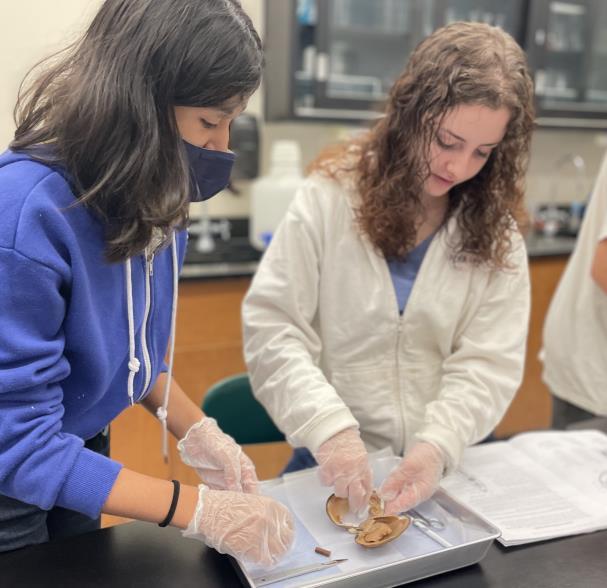
6 minute read
Science Department
Placement
Science placement is determined upon admission to the School by examining previous transcripts. Students may adjust their science course during their first year after assessment by their teacher, the Science Department Chair, and the Academic Office.
Students must take Biology, Physics or Chemistry, and one science elective (not AP Psychology) to graduate. Our College Counseling Office recommends taking four years of high school science.
Sequence

Middle School
MS.305/ STEM 7
Required for all 7th Graders
STEM 7 is a hands-on, problem-based course that introduces students to physical science concepts and promotes the use of an understanding of those concepts in the context of authentic problem solving. The course emphasizes an engineering design and inquiry approach, which encourages students to seek out information and uncover an understanding of natural phenomena. Students learn to ask questions and explore the world while designing, building, and testing innovative solutions to real world problems. In preparation for future STEM and science courses, students will be taught how to identify problem criteria and constraints, model and test prototypes, observe (both qualitatively and quantitatively) and record, create and test hypotheses, and develop evidencebased explanations.
MS.310/ STEM 8
Required for all 8th Graders
STEM 8 is a hands-on, problem-based course that introduces students to Earth Science concepts and promotes the use of an understanding of those concepts in the context of authentic problem solving. The course emphasizes an engineering design and inquiry approach, which encourages students to seek out information and uncover an understanding of natural phenomena. Students learn to ask questions and explore the world while designing, building, and testing innovative solutions to real world problems. In preparation for future STEM and science courses, students will be taught how to identify problem criteria and constraints, model and test prototypes, observe (both qualitatively and quantitatively) and record, create and test hypotheses, and develop evidencebased explanations.
MS.320/ Health and Human Flourishing 8 (Fall and Spring Semesters)
Required for all 8th graders
Health and Human Flourishing 8 is designed to teach students how to flourish physically, mentally, emotionally, and socially. This cross-disciplinary course equips students to make wise decisions about their relationships, their physical growth and development, substance use, media engagement and consumption, and their mental and emotional health. Health 8 accomplishes these curricular goals through a combination of direct instruction and Ethics Bowl debates connected to these topics. The specific topics taught in Health 8 will be age-appropriate, focusing especially on empathy, communication, conflict resolution, bullying, puberty, diet and nutrition, fitness, internet safety, stress, anxiety, time management, and the dangers of substance abuse.
Upper School
S.150/Health and Human Flourishing II (Fall and Spring Semesters)
Required for 9-12th grade any student who has not met the Health graduation requirement Must be taken by the end of a student’s sophomore year
Health and Human Flourishing II is designed to teach students how to flourish physically, mentally, emotionally, and socially. This cross-disciplinary course equips students to make wise decisions about their relationships, their physical growth and development, substance use, media engagement and consumption, and their mental and emotional health. HHF II accomplishes these curricular goals through a combination of direct instruction and Ethics Bowl debates connected to these topics. The specific topics taught in HHF II will be age-appropriate, focusing especially on safety and violence, reproduction and sexual ethics, digital citizenship, mental disorders, selfharm, and various forms of addiction. (0.5 credits)

S.120/ Biology
Biology or Biology Honors is required for all 9th graders
This course introduces the major concepts of biology with a special emphasis on genetics and human biology. The course includes a survey of life on Earth; basic fundamentals in physics and chemistry that lay the foundation for biological processes; a study of cells and genetics (both classical and molecular); and, finally, a study of human biology. (1 credit)
S.121/ Biology Honors
Prerequisite: A- in previous science course Biology or Biology Honors is required for all 9th graders

This course introduces the major concepts of biology with a special emphasis on genetics and human biology. The course includes a survey of life on Earth; basic fundamentals in physics and chemistry that lay the foundation for biological processes; a study of cells and genetics (both classical and molecular); and, finally, a study of human biology. (1 credit)
S.140/ Chemistry
Prerequisite: Algebra I
This course is designed to show students how chemical principles and concepts are developed and operate. Among the topics covered are atomic structure, chemical bonding, and the chemical behavior of solids, liquids, and gasses. The course is centered around regular laboratory work. (1 credit)
S.141/ Chemistry Honors
Prerequisite: A- in Geometry and at least taking Algebra II Honors concurrently
This course is designed to show students how chemical principles and concepts are developed and operate. Among the topics covered are atomic structure, chemical bonding, and the chemical behavior of solids, liquids, and gasses. The course is centered around regular laboratory work. (1 credit)
S.160/ Physics
The fundamental laws and phenomena of mechanics, heat, wave motion, sound, electricity, magnetism, and light, including quantum mechanical concepts and atomic and nuclear physics comprise this year-long course. Content is explored through classroom lecture, student discussion, interactive demonstrations, and laboratory explorations. (1 credit)
S.161/ Honors Physics
Prerequisites: B+ in Geometry
This is a college-level, algebra-based Physics course, which requires students to have a fluent understanding of algebra and right-triangle trigonometry. The topics that will be covered include Mechanics (Kinematics, Dynamics, Circular Motion, Torque, Rotation, Energy, and Momentum), Electricity (Electric Charge and Force, DC Circuits), and Waves (Simple Harmonic Motion, Mechanical Waves and Sound). Labs comprise approximately 20% of the course. (1 credit)
S.180/ Anatomy and Physiology
Prerequisite: Completion of Biology or Biology
Honors
Priority given to 11th and 12th graders Building on what is learned in Biology, Anatomy and Physiology introduces students to the structure and function of the human body. Included is an orientation of the human body, basic principles of chemistry, a study of cells and tissues, and an in-depth exploration of the many systems that coordinate to maintain homeostasis. Dissection, histological studies, and physiology are featured in the required laboratory experience. (1 credit)
S.185 / Astronomy
Prerequisites: Geometry and Algebra II
Open to 11th and 12th graders only This course is an introduction to astronomical and cosmological concepts. The course will cover topics such as astronomical tools and techniques, the composition of the solar system, the life cycle and makeup of stars, the building blocks of a galaxy, exoplanets and extraterrestrial life, black holes, and the Big Bang. This course is an elective for those in their junior or senior year who are interested in the cosmos and want to expand their understanding of the physical universe. (1 credit)
S.301/ AP Biology
Prerequisites: B+ in Biology Honors and B in Chemistry Honors. Students may take Chemistry Honors concurrently with a previous year GPA of 4.0 or higher. Please see the Registrar if interested. This course focuses on enduring, conceptual understandings and the content that supports them (Big Ideas, Enduring Understandings, Essential Knowledge). This approach enables students to spend less time on factual recall and more time on inquiry-based learning of essential concepts, and will help them develop the reasoning skills necessary to engage in the science practices used throughout their study of AP Biology and other sciences. Students who take an AP Biology course will also develop advanced inquiry and reasoning skills, such as designing a plan for collecting data, analyzing data, applying mathematical routines, and connecting concepts in and across domains. The result will be readiness for the study of advanced topics in subsequent college courses. The revised AP Biology course is equivalent to a twosemester college introductory biology course. The College Board expects 25% of all AP science courses to be “hands-on”. To accommodate that goal all AP Biology students have a weekly laboratory session during the school day. (1 credit)
S.302/ AP Chemistry
Prerequisites: B+ in Chemistry Honors & Biology Honors and B in Pre-Calculus Honors. Students who take Chemistry Honors online should see the Academic Office as they may be eligible for AP Chemistry only with additional laboratory and course work.

The AP Chemistry course is designed to be the equivalent of a college level general chemistry course. The course explores the structure of matter, states of matter, reactions, and descriptive chemistry. Significant time is devoted to chemical calculations as well as refining chemistry lab skills. AP Chemistry has one required extra lab session per week. (1 credit)

S.303/AP Environmental Science
Prerequisite: B+ in previous high school science course and completion of Physics or Chemistry
Priority given to 11th and 12th graders
The AP Environmental Science course is designed to be the equivalent of an introductory college course in environmental science. The goal of the course is to provide students with the specific scientific principles, concepts, and methodologies required to understand the interrelationships of the natural world. Further, students identify and analyze environmental problems both natural and humanmade, evaluate the risks associated with these problems, and examine alternative solutions for resolving or preventing environmental degradation as we seek to be good stewards of the Earth. APES has one required extra lab per week. (1 credit)










